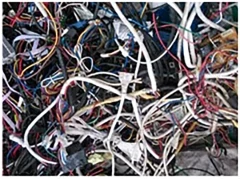
10 月 . 11, 2024 08:37 Back to list
Recycling Bin for Electronics A Step Towards Sustainable E-Waste Management
In an increasingly digital world, electronic devices have become an integral part of our daily lives. From smartphones and laptops to kitchen appliances and televisions, electronics are ubiquitous. However, the rapid pace of technological advancement has led to an alarming rise in electronic waste (e-waste). In 2021 alone, the world generated approximately 57.4 million metric tons of e-waste, a figure that is expected to grow by 21% by 2025. This surge in e-waste poses significant environmental challenges, emphasizing the urgent need for effective recycling solutions, such as designated recycling bins for electronics.
The Importance of E-Waste Recycling
E-waste comprises discarded electronic devices that often contain hazardous materials such as lead, mercury, and cadmium. When improperly disposed of, these substances can leach into the soil and groundwater, posing serious risks to both human health and the environment. Moreover, many electronic products contain valuable materials like gold, silver, and rare earth elements that can be recovered and reused through recycling processes. Establishing recycling bins specifically for electronics is crucial for addressing these issues.
What is an Electronic Recycling Bin?
An electronic recycling bin is a designated receptacle specifically designed for the collection and safe disposal of electronic devices and accessories. These bins are typically installed in various public areas, such as shopping centers, schools, and community centers, making it easier for individuals to dispose of their old electronics responsibly. Unlike regular trash bins, electronic recycling bins are designed to accommodate specific types of e-waste, ensuring that hazardous materials are kept separate from the general waste stream.
Benefits of Using Recycling Bins for Electronics
1. Environmental Protection The primary goal of recycling bins for electronics is to minimize e-waste's environmental impact. By encouraging proper disposal, these bins help prevent toxic substances from contaminating the environment and promote the recovery of valuable materials for reuse.
2. Convenience With designated recycling bins, individuals can easily dispose of their electronic devices without the hassle of finding a specialized recycling facility. This convenience increases the likelihood that people will participate in recycling programs rather than tossing their old electronics in the trash.
3. Education and Awareness Installing recycling bins for electronics serves as an educational tool. It raises awareness about e-waste and its impact on the environment, encouraging individuals to think critically about their consumption habits and the life cycle of their electronic devices.

4. Community Engagement Electronic recycling bins can foster community involvement. Local governments and organizations can host collection events, where residents can drop off their unwanted electronics, creating a culture of collaboration and sustainability.
Implementing Recycling Bins for Electronics
To maximize the effectiveness of electronic recycling bins, communities can take several steps
1. Awareness Campaigns Launching awareness campaigns can educate the public about the importance of e-waste recycling and how to properly use the bins. This can include social media efforts, flyers, and community workshops.
2. Partnerships Local governments can partner with electronic retailers and waste management companies to create a streamlined process for collecting and recycling e-waste. These partnerships can help ensure that the discarded electronics are processed responsibly.
3. Regular Maintenance To keep the recycling bins effective and appealing, regular maintenance is crucial. This includes emptying the bins, ensuring they are in good condition, and replacing any damaged signage.
4. Feedback Mechanism Establishing a feedback mechanism will allow users to report issues such as overflowing bins or damaged containers, helping maintain a high standard of service and functionality.
Conclusion
In conclusion, recycling bins for electronics represent a critical step in addressing the growing problem of e-waste. By promoting responsible disposal and recycling practices, we can protect the environment, recover valuable resources, and create a sustainable future for generations to come. As individuals, we must take responsibility for our electronic waste and contribute to a greener planet through mindful actions, starting with utilizing e-waste recycling bins in our communities.
Latest news
Unveiling the Power of Eddy Current Separator
NewsSep.25,2024
Transform Your Home Recyclin:home metal shredder
NewsSep.25,2024
The Future of Waste Management with Recycling Line Picker
NewsSep.25,2024
The Benefits of a Metal Recycling Plant
NewsSep.25,2024
Revolutionize Material Separation with Onwang Technology
NewsSep.25,2024
Innovative Waste Management: Unveiling the MSW Sorting Plant
NewsSep.25,2024